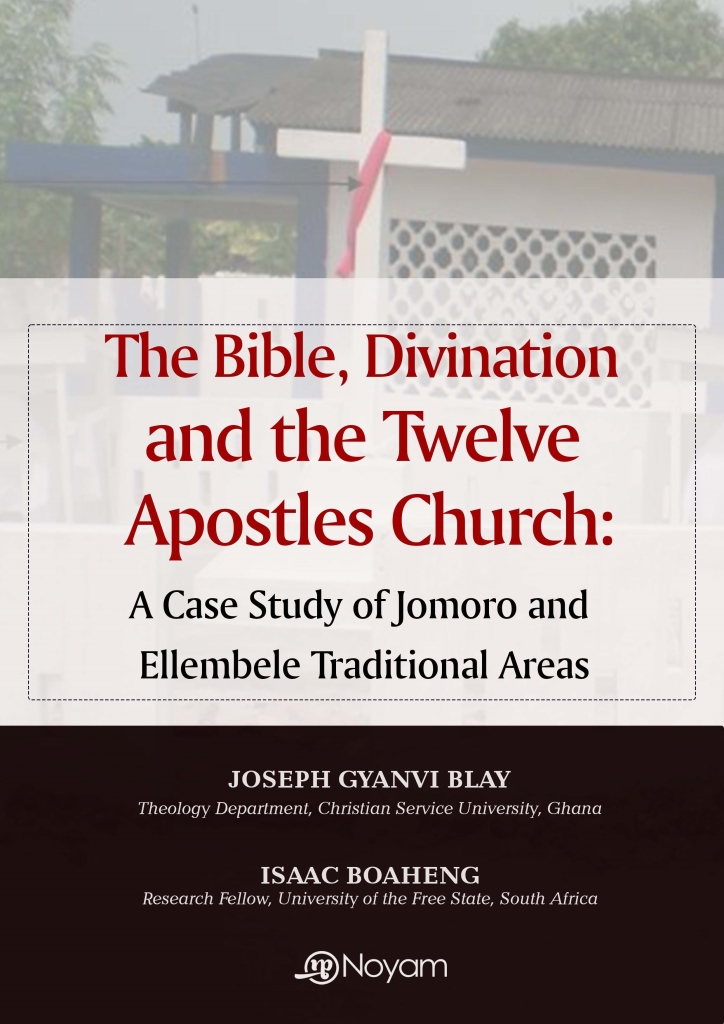
The Bible, Divination and the Twelve Apostles Church: A Case Study of Jomoro and Ellembele Traditional Areas
Author: Joseph Gyanvi Blay & Isaac Boaheng
ISBN 978–9988–9531–6–4
DOI: 10.38159/npub.eb2025102
Published: 7th November, 2025.
The encounter between Christianity and African traditional religion has long been characterized by tension, misunderstanding, and theological gaps. Early missionary efforts, shaped by colonial ideologies and Western cultural frameworks, often failed to engage meaningfully with African worldviews and spiritual needs. This disconnect left many African Christians in a state of religious and cultural dissonance, prompting the rise of independent prophetic movements that sought to contextualize the Christian faith within African realities.
This book explores one such movement—the Twelve Apostles Church of Ghana—tracing its roots to the prophetic ministry of William Wade Harris and focusing particularly on its development in the Nzema area. The study examines how indigenous beliefs and practices, especially divination, became integrated into the church’s theology and spirituality, even as these elements diverged from the missionary legacies that originally shaped African Christianity.
This book is structured into seven chapters, each addressing a key aspect of the study. Chapter One provides an introductory framework, outlining the background, research methodology, and overall organization of the work. Chapter Two explores the origins, doctrinal beliefs, and religious practices of the Twelve Apostles Church. Chapter Three examines the process of initiation and training into the priesthood within the church, shedding light on its unique spiritual formation. In Chapter Four, an exegetical analysis of 1 Samuel 9:1–10:26 is undertaken, alongside a comparative discussion of how this biblical passage is interpreted by both scholars and the Twelve Apostles Church. Chapter Five investigates the practice of divination as it exists within the church, while Chapter Six evaluates its perceived significance and practical implications for church members. The final chapter, Chapter Seven, offers a summary of the major findings, followed by general conclusions. With this overview in place, the book now turns to the next chapter, which examines the historical emergence and growth of the Twelve Apostles Church.
By employing a qualitative case study approach, this research offers a detailed ethnographic and theological investigation into the practice of divination within the Twelve Apostles Church. Drawing insights from 1 Samuel 9–10:26 and from interviews with church prophets, prophetesses, devotees, and members, the study reflects on how African Independent Churches mediate spiritual experiences in ways that resonate with the socio-religious context of their communities.
This work contributes meaningfully to the growing body of literature on African Independent Churches (AICs), African Christian theology, and contextual biblical interpretation, particularly in relation to the Old Testament. It highlights how AICs such as the Twelve Apostles Church represent both a theological response and a socio-cultural reimagining of Christianity in Africa—one that seeks to reclaim spiritual agency, address existential concerns, and affirm African identity within the Christian faith. By examining the practice of divination in the light of 1 Samuel 9–10:26, the book not only engages in biblical exegesis from an African perspective but also raises critical questions about continuity and discontinuity between African traditional spiritual practices and Christian revelation. In doing so, it opens up fresh conversations on how African religious experiences can inform theological discourse, shape pastoral care, and revitalize Christian worship and community life in the African context. Ultimately, the study invites theologians, biblical scholars, church leaders, and lay readers alike to reflect on the potential of African Christianity to develop its own authentic voice—rooted in Scripture, sensitive to culture, and responsive to the spiritual needs of the people.
DEDICATION.. iv
ACKNOWLEDGEMENTS. v
PREFACE.. vi
CHAPTER ONE.. 1
GENERAL INTRODUCTION.. 1
Methodology for the book. 5
Organization of the Book. 8
CHAPTER TWO.. 10
EMERGENCE, PRACTICES AND DOCTRINES OF THE TWELVE APOSTLES CHURCH 10
The Ministry of Prophet William Wade Harris. 10
A Brief History of the Twelve Apostles Church. 17
Characteristics of the Twelve Apostles Church. 22
The Liturgy of the Twelve Apostles Church. 32
The Doctrines of the Twelve Apostles Church. 35
CHAPTER THREE.. 42
ENROLMENT INTO THE PRIESTHOOD OF THE TWELVE APOSTLES CHURCH 42
Training. 44
Graduation or Ordination Ceremony. 46
Conclusion. 58
CHAPTER FOUR.. 60
BIBLICAL INTERPRETATION OF THE PASSAGE 1 SAMUEL 9: 1—10:26 60
Historical Account of the Passage. 60
Interpretation of 1 Samuel 9:1-10:27. 62
Interpretation by Seclected Scholars. 62
Interpretation by the Twelve Apostles Church. 74
Conclusion. 77
CHAPTER FIVE.. 78
THE CONCEPT OF DIVINATION IN THE TWELVE APOSTLES CHURCH 78
Types of Divination. 79
Articles for divination. 86
The Meaning of Divination in the Twelve Apostle Church. 87
Conclusion. 91
CHAPTER SIX.. 92
DIVINATION AND ITS RELEVANCE IN THE TWELVE APOSTLES CHURCH 92
The Relevance to Religious Life. 92
The Relevance of Divination to the Socio-Moral Life of Members of the Twelve Apostles Church 93
Relevance of Divination to their Economic Life. 95
Impact of Divination on Church Growth. 96
Conclusion. 98
CHAPTER SEVEN.. 99
CONCLUSION.. 99
Summary and Conclusion. 99
Recommendations. 103
BIBLIOGRAPHY.. 106
APPENDIX 1. 109
PICTURES OF SOME SACRED ITEMS. 109
ABOUT AUTHORS. 111
Joseph Gyanvi-Blay holds an M.A and MPhil in Religion and Human Values from the University of Cape-Coast, Ghana where he is currently pursuing his doctoral studies. He is a Lecturer at the Christian Service University, Ghana. Gyanvi-Blay has published a number of peer reviewed articles. He is married to Philomena and a son, Godspower Egya-Blay
Isaac Boaheng holds a PhD in Theology from the University of the Free State, South Africa. He is a Senior Lecturer in Theology and Christian Ethics at the Christian Service University, Ghana, and a Research Fellow at the Department of Biblical and Religion Studies, University of the Free State, South Africa. Boaheng is married to Gloria, and they are blessed with five children.
Gyanvi-Blay, Joseph, and Isaac Boaheng. The Bible, Divination and the Twelve Apostles Church: A Case Study of Jomoro and Ellembele Traditional Areas.(Accra: Noyam, 2025).
